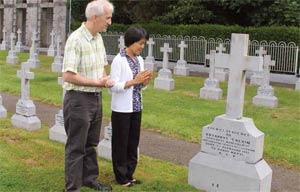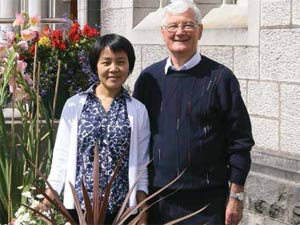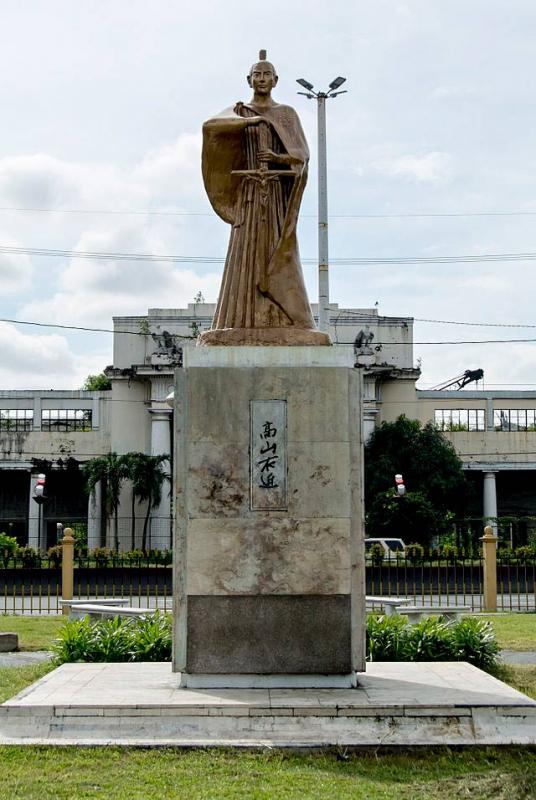Misyon Online - May-June 2015

PULONG NG EDITOR
On 26 April, Good Shepherd Sunday, Pope Francis ordained 19 priests for the Diocese of Rome. In his homily he said: ‘And this is the nourishment of the People of God; that your sermons are not boring; that your own homilies reach people's hearts because they come from your heart, because what you are saying is truly what you have in your heart. So give the Word of God, and thus your doctrine will be joy and support for the faithful of Christ; the scent of your life will be the testimony, because the example builds.’
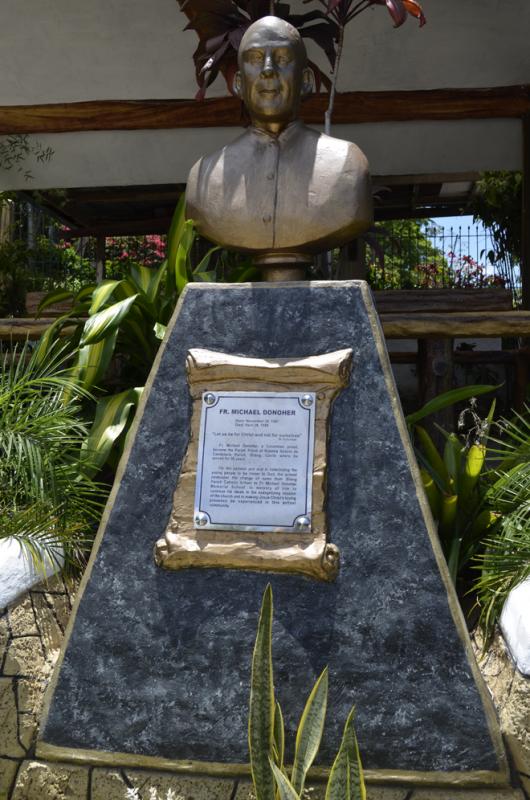
Bust of Fr Michael Donoher

DIACONATE ORDINATION REFLECTION
By Reverend Kurt Zion Pala
The author wrote this reflection some time before he was ordained deacon in the Columban House of Studies, Quezon City, on 15 March this year by Bishop Honesto F.Ongtioco of the Diocese of Cubao. Immaculate Conception Cathedral is within walking distance of the Formation House. This article first appeared on the website of the Columbans in the USA.
|
In this video made in Fiji while both were still on First Mission Assignment, Carlo Jung, ordained in Seoul on 1 November 2014 and who will be going later this year to Myanmar on his first assignment as a priest, and Kurt Zion Pala, ordained deacon on 15 March this year, reflect on their vocations in the context of their presence in Fiji.
|

A LEARNING VISIT TO THE PHILIPPINES
By Anna Brown
Anna Brown is the first ‘Faith in Action Graduate Volunteer’, spending a year working with Columban Justice and Peace Education and St Mary’s University Chaplaincy. In the article below she reflects on a recent learning visit to the Philippines.
I was incredibly fortunate to spend an amazing month learning about the Columbans’ work. It was helpful for my work here in Britain as we often talk about poverty when discussing justice and peace issues in schools. Visiting slum districts, rural communities and urban industrial areas of the Philippines, I was able to begin to understand something of the complexity of poverty – there are rich and poor in every community. I am excited to talk to other young people about this, avoiding simple stereotyping and giving real thought to the language we use.
|
|

THE UNFINISHED STORY OF A VALIANT WOMAN
By Fr Joseph Broderick
The author is a Columban priest from Ireland. He was ordained in 1969. He went to Japan in 1970 and, apart from six years working in Britain, 1994 to 2000, has beenthere ever since.
 When we think of the missionary work of the Columbans in Japan we must not forget the Trojan work done by Japanese catechists. Very often they were the right-hand ‘Samurai’ of trailblazing Columban missionaries. One such catechist is Miss Tsuneko Hinata.
When we think of the missionary work of the Columbans in Japan we must not forget the Trojan work done by Japanese catechists. Very often they were the right-hand ‘Samurai’ of trailblazing Columban missionaries. One such catechist is Miss Tsuneko Hinata.
She was born into a traditional Buddhist family, grew up in the Buddhist tradition and after high school became a professional working woman in a company, but never married. At the age of 40, she ran into crisis time: ‘What is life all about? What am I working like a slave for? What happens to me after death?’
She went searching for answers in the Catholic Church. There she found Christ and her answers, and then went on to receive baptism. She was filled with joy and a new conviction.
But another crisis arose: ‘What do I do with this new joy and conviction? I have to share it with others. How can I do that?’
She decided to quit her professional career in the company and enter the Japanese Catechist School. As a newly graduated catechist she was first employed by the late New Zealand, Columban Fr James Norris and thus began her long journey working full-time for the church, with the Columbans, for meager wages and within even more ‘meager’ living quarters. She became the mouthpiece of the language-struggling Columbans, taught daily the doctrine to truth-seeking searchers, visited the sick at home and in hospital, walked with the newly baptized on their journey of faith in a non-faith environment, and became a spiritual mother to all her spiritual children. She took no credit for her work. It was her way of living out the Gospel.

NOT JUST THE DEATH OF A PERSON BUT OF A HISTORY
SHANGHAI (SE): Monica was buried in the final days of December last year. A few more months of life would have seen her live for 100 years on this earth.
|
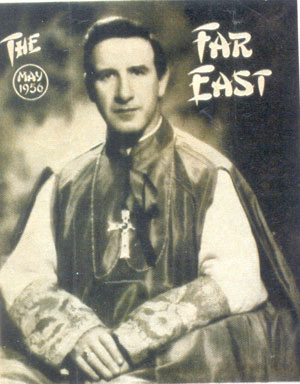 Known by her Christian friends as Monica, Xia Jingxian had belonged to the Handmaids of Our Lady, a diocesan group of religious sisters set up in Hanyang by Bishop Edward Galvin in the 1930s.
Known by her Christian friends as Monica, Xia Jingxian had belonged to the Handmaids of Our Lady, a diocesan group of religious sisters set up in Hanyang by Bishop Edward Galvin in the 1930s.
However, in the face of the advancing Communist army the Irish bishop disbanded the group for the safety of its members and to give them an opportunity to make a new life in what was to prove a hostile environment.
Monica was a nurse and she arrived in Shanghai as a young woman at a time when the Japanese Imperial Army was menacing the population.
She was one of two girls and three boys and her family was forced to leave its home in Xiantao, Hubei, in 1935 to escape the huge flood that followed the bursting of a dam on the Yangtse River.
They used a small boat to get to Hanyang, where she studied at a Columban school and learned embroidery.

Frank Patterson sings Bring Flowers Of The Rarest
O Mary we crown thee with blossoms today!
Queen of the Angels and Queen of the May.

Pulong ng Editor
On 26 April, Good Shepherd Sunday, Pope Francis ordained 19 priests for the Diocese of Rome. In his homily he said: ‘And this is the nourishment of the People of God; that your sermons are not boring; that your own homilies reach people's hearts because they come from your heart, because what you are saying is truly what you have in your heart. So give the Word of God, and thus your doctrine will be joy and support for the faithful of Christ; the scent of your life will be the testimony, because the example builds.’

Bust of Fr Michael Donoher
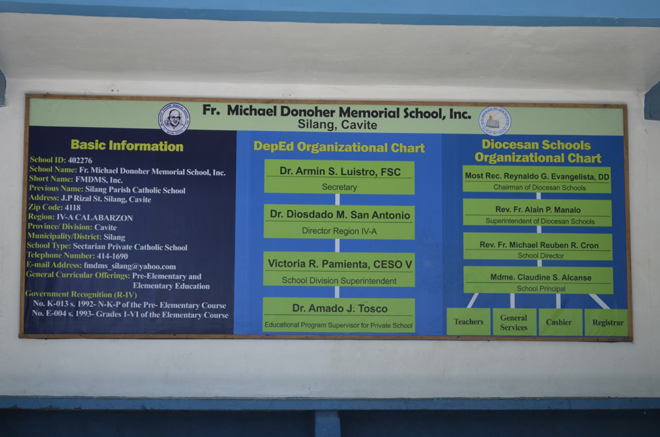
Organizational Chart of Fr. Michael Donoher Memorial School, Inc.
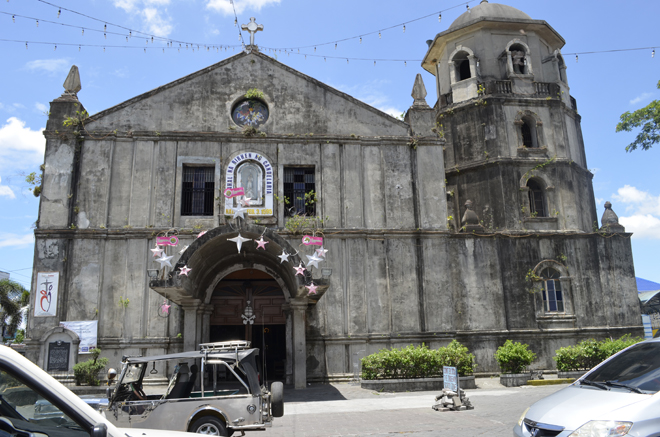
Our Lady of Candelaria Church.
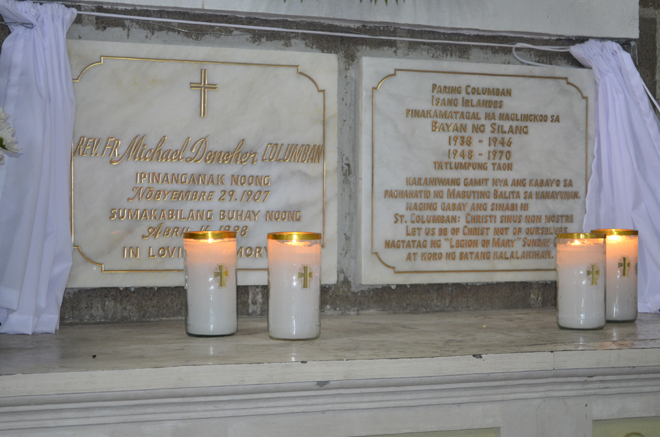
Memorial plaque where Fr Donoher's remains lie
On 16 March many Columbans, at the invitation of parish priest Fr Marty A. Dimaranan, took part in a Mass in Our Lady of Candelaria Church, Silang, Cavite, in the Diocese of Imus to mark the 27th death anniversary of Columban Fr Michael Donoher who had been parish priest there from 1938 until 1970. Fr Donoher was then transferred to the Diocese of Iba, Zambales. His remains lie in the church in Silang.
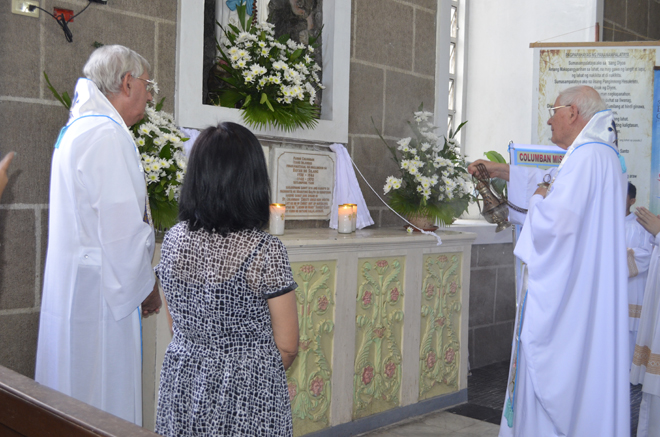
Fr Daniel O'Malley, Regional Director of the Columbans, Philippines, and Fr
John Keenan at memorial plaque
Fr John Leydon, who served in Silang some years after Fr Donoher left, was the main celebrant and Fr John Keenan who was an assistant to Fr Donoher in Silang, was the preacher. Before the final blessing a plaque in honor of the late Columban priest was unveiled inside the church where he is buried.
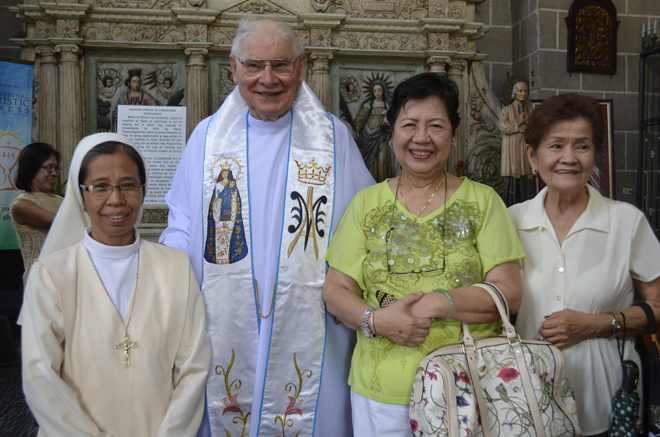
Fr John Keenan with some parishioners
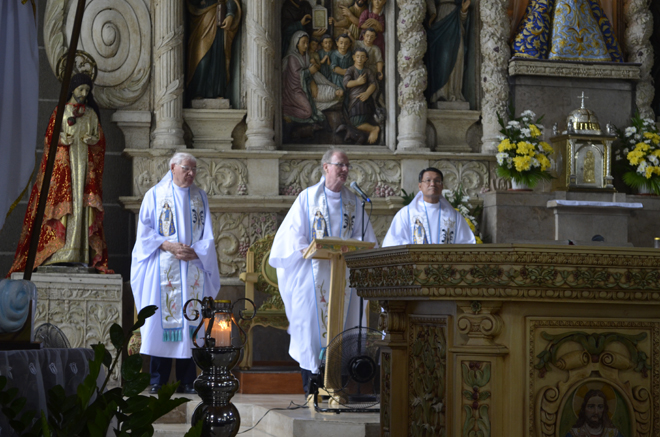
L to R: Fr John Keenan, Fr John Leydon, Fr Marty A. Dimaranan
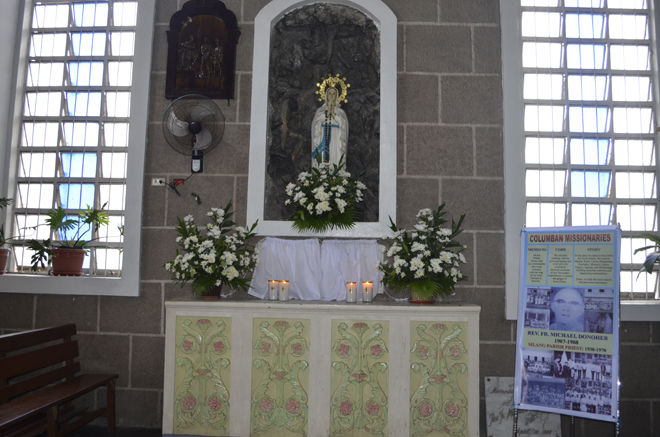
Burial place of Fr Donoher's remains
Fr Michael Donoher, from County Roscommon in the west of Ireland, like many other Columbans who left their homelands to come to the Philippines or to go to other countries where Columbans served, was a priest about whom his parishioners could say, ‘What you are saying is truly what you have in your heart.’ His 32 years of faithfulness to the people of Silang, a period that included World War II, spoke powerfully to them of the faithfulness of God to them. Six of his fellow Columbans in the Philippines died violently during those war years, their deaths a testimony of God’s presence among the people in the worst of times, a God who did not abandon his people.
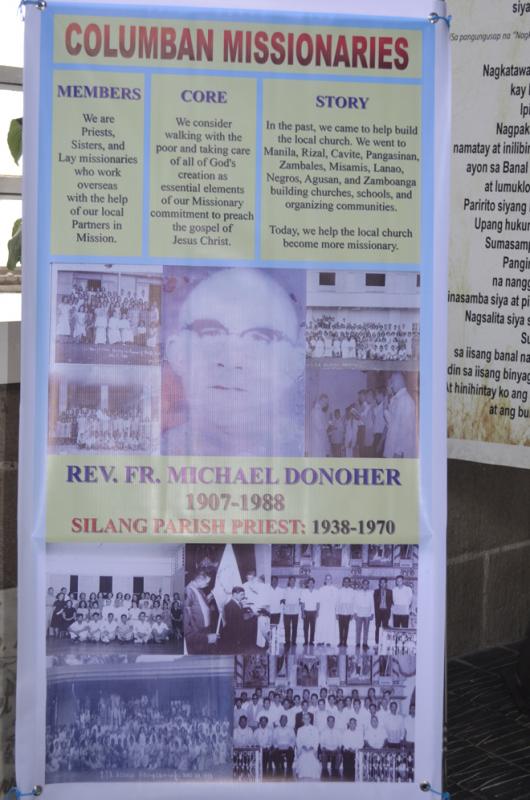
Fr Michael Donoher
These were priests who kept ‘in mind the example of the Good Shepherd, who came not to be served but to serve; not to stay in his comfort, but to go out and seek and save what was lost’, as Pope Francis said to the young men he was about to ordain.
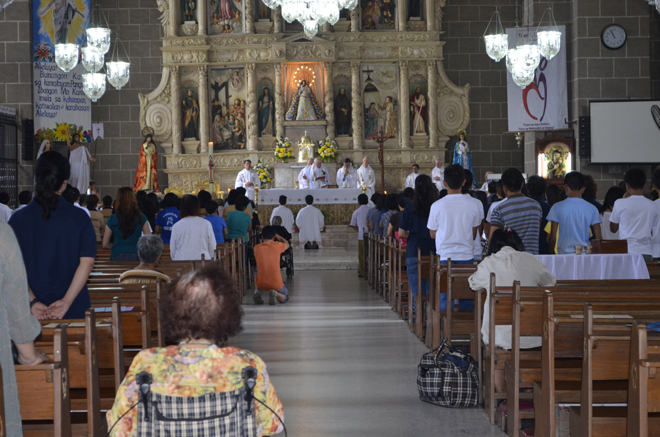
During the Mass
We thank God for the faithfulness of Fr Michael Donoher and of many others like him.
A learning visit to the Philippines
Anna Brown is the first ‘Faith in Action Graduate Volunteer’, spending a year working with Columban Justice and Peace Education and St Mary’s University Chaplaincy. In the article below she reflects on a recent learning visit to the Philippines.
Under the watchful eye of St Columban at San Columbano Mission Center,
Batang, Himamaylan City, Negros Occidental: L to R: Michael Javier, Gilda Comays,
Naanise Mo’unga, Fr Brian Gore, Arlenne Villahermosa, Lorna Cañete and Anna
Brown.
I was incredibly fortunate to spend an amazing month learning about the Columbans’ work. It was helpful for my work here in Britain as we often talk about poverty when discussing justice and peace issues in schools. Visiting slum districts, rural communities and urban industrial areas of the Philippines, I was able to begin to understand something of the complexity of poverty – there are rich and poor in every community. I am excited to talk to other young people about this, avoiding simple stereotyping and giving real thought to the language we use.
|
|
Anna Brown (L) with CLMs Gilda Comayas and Lorna Cañete (front seat) and
Michael Javier and Naanise Mo’unga behind. Gilda, Lorna and Michael form 'Ph 22'
and are due to leave for Chile in May. Naanise, from Tonga, has been in the
Philippines since 2007.
The numbers of street children really shocked me, and the ways in which the Columbans use charity and justice together were fascinating. I was humbled to see works of charity, for example in feeding programs, but directly linked to work for justice. The Columban parish in Manila, Our Lady of Remedies, Malate, feeds those who need food, but also empowers them to campaign for their own rights over land and provides education programs and support. One Filipina told me, ‘It is so important we teach people how to use a fishing net not just give them a fish, otherwise dependency will kill my beautiful community’. I will certainly remember this in my ongoing work.
Anna Brown (R) with CLMs Michael Javier, Lorna Cañete and Gila Domayas of PH
22, due to leave for Chile, and Columban Fr Leo Distor, Parish Priest, Our Lady
of Remedies, Malate, Manila.
My visit to the Philippines was also valuable in terms of learning about faith. I was in Cebu as a guest of the Salesians for the Sinulog festival, honoring the Santa Niño (Child Jesus). This was a festival to remember, spread across a weekend and filled with boat rides, dancing and the biggest parade you could imagine! It was a privilege to see this unique side of the Catholic Church. I felt uncomfortable at times in the huge crowds and it didn’t always feel like a prayerful, religious celebration – I found myself asking questions about the wealth and extravagancy of the festival. But there was an amazing sense of community and it was a lot of fun dancing with Filipino friends as they enjoyed the festivities. Religion was truly embraced and it was refreshing to see a community really celebrate their living faith. It made me think about how I might express my own faith more boldly in my work, and especially how I witness to our students at St Mary’s.
Anna Brown (R) with Columban Lay Missionaries Michael Javier, Gilda Comayas
and Lorna Cañete of PH 22, due to leave for Chile, and Naanise Mo’unga of Tonga
has been in the Philippines as a Columban Lay Missionary since 2007.
I was incredibly blessed to visit PREDA and Fr Shay Cullen, and to see their work preserving the rights and dignity of children who have been trafficked and imprisoned. It was really eye-opening, visiting the girls’ and the boys’ homes as well as spending time with the legal team. I learnt so much about the horrors of child sex trafficking and the work needed to end this. PREDA also was an amazing witness to the importance of seeing the ‘crossovers’ in justice issues. The effects of climate change are apparent all over the Philippines. One of the consequences of this is natural disasters. The loss of income and stability caused by these sometimes leads to children being forced into making money through illegal means, sometimes in the sex industry. PREDA works to eliminate both cause and consequence, freeing and rehabilitating children but also working with rural communities to farm organically and support fair trade livelihood projects. It was so helpful to witness first hand (even if I was only scratching the surface of this complex issue) the injustice that is evident in Olongapo City and the work tackling this. For our work here in Britain it is so important that we discuss these complex issues, highlighting that action comes in many forms as often different justice issues are intertwined – something I hadn’t totally understood before my trip.
Anna Brown with Arlenne Villahermosa, Coordinator, Columban Lay
Missionaries, Philippines
I have left the Philippines with an overwhelming sense of gratitude. Gratitude for the amazing hospitality of those who looked after me, who told me their stories, shared their lives and let me experience the amazing work they are doing. Finally and extremely importantly I am thankful for the opportunity that I now have to share my experiences and discuss these questions around justice within the education work I do with both the Columbans and at St Mary’s.
Diaconate Ordination Reflection
By Reverend Kurt Zion Pala
The author wrote this reflection some time before he was ordained deacon in the Columban House of Studies, Quezon City, on 15 March this year by Bishop Honesto F.Ongtioco of the Diocese of Cubao. Immaculate Conception Cathedral is within walking distance of the Formation House. This article first appeared on the website of the Columbans in the USA.
|
In this video made in Fiji while both were still on First Mission Assignment, Carlo Jung, ordained in Seoul on 1 November 2014 and who will be going later this year to Myanmar on his first assignment as a priest, and Kurt Zion Pala, ordained deacon on 15 March this year, reflect on their vocations in the context of their presence in Fiji.
|
Among the mysteries in life for me is God’s call for me to be one of His priests. It is something I struggle with because who am I to be called by Him? It is also a gift I am very grateful for, because it has allowed me to participate in the faith and life journey of persons in >ways I could never have done if I had not joined the Columbans. My life has truly been enriched by these encounters hoping I too have enriched the lives of others in some ways.
Homily at Ordination to Diaconate of Reverend Kurt Zion Pala
On 15 March this year the Reverend Kurt Zion Pala was ordained at the Columban Formation House in Quezon City. The Formation House is within walking distance of Immaculate Conception Cathedral, Diocese of Cubao. The homily has been slightly edited.
|
When I first thought of becoming a priest, I was just a small boy around the age of ten. I was then an altar server. Now more than 20 years later, I am preparing for my ordination to the diaconate, the final step before becoming a priest. For us, it is a long engagement, a total of ten years which includes studies in philosophy and theology, a year of spiritual discernment and a stint on the missions outside the Philippines, in my case the beautiful happy islands of Fiji.
If you ask me why I wanted to become a Columban missionary priest, I only have one answer – deep in my heart is this overwhelming joy and gratitude I have for God for loving and accepting me for who I am. It is out of this gratitude that I also want to share this joy with others as a missionary priest in far distant islands like Fiji. I do think this is crazy. It is a life of uncertainty in worldly and human terms, but certainly it has been a life of joy for me. I guess I am crazy, a fool. Heeding the words of Pope Francis to young people: ‘Do not bury your talents! Set your stakes on great ideals, the ideals that enlarge the heart, the ideals of service that make your talents fruitful. Life is not given to us to be jealously guarded for ourselves, but is given to us so that we may give it in turn. Dear young people, have a deep spirit! Do not be afraid to dream of great things!’ I hope to be an instrument of God’s love, a life for the world.
If not for my family, friends, and the Columban community I wouldn’t have made it this far. If not for God’s dream in me, I wouldn’t be here. I am grateful to my family for allowing me and supporting me to pursue this dream. I have not always been the perfect son or perfect brother, but I will be there for them and love them. I am especially grateful to my father whom I only got to know and understood more in the last few years of his life until he died in a work-related accident. He taught me to always do what makes me happy and pursue my dreams. He never complained and took his responsibility as a father seriously.
Many people have inspired me, pushed me, challenged me and loved me through this journey. I would like to thank each one of you for making it a lot more like an adventure for me and I’ve always seen and dreamt of myself that one day I will be somewhere in the world bringing the joy of the Gospel as a missionary. Thank you!
As I prepare in the coming days for my ordination to the diaconate, please whisper a prayer as for me. I will be keeping you in my prayers, too. I will soon leave the four walls of the Columban House of Studies. Thank you, too my formators, staff and brothers for bringing out the best of me all through these years. I am forever a student of life.
back to top

Homily at Ordination to Diaconate of Reverend Kurt Zion Pala
By Bishop Honesto F. Ongtioco, Diocese of Cubao
On 15 March this year the Reverend Kurt Zion Pala was ordained at the Columban Formation House in Quezon City. The Formation House is within walking distance of Immaculate Conception Cathedral, Diocese of Cubao. The homily has been slightly edited.
The readings for the Mass are here.
The new deacon with Bishop Ontioco and Columban priests and seminarians
We are now in the Fourth Sunday of Lent – Laetare Sunday. Today the Church invites us to reflect on God’s love for the world and to be joyful because of it. ‘Rejoice, Jerusalem! Be glad for her, you who love her; rejoice with her, you who mourn for her’ (Is 66:10-11). The Church invites us in the middle of the penitential season of Lent to rejoice. Why? What is the reason for this rejoicing? Because God loves each and every one of us so much that He gives us His only Son. The message of the Gospel is clear - it is the love of God that allowed Him to give His only Son. It is in this context, Kurt, that you are to be ordained today to the diaconate – a ministry of charity. Your ordination therefore is not only a sign of charity but also the very sacrament of God’s self-emptying love.
The first reading reminds us tenderly of this love, unworthy as we are. Because of their forgetfulness and many infidelities, the Israelite people were punished and forced into exile, brought low by slavery. But God reminds us that His ways are not our ways, that His love is more powerful than our sins. And so, using a pagan, King Cyrus, as instrument, he frees his people from exile and brings them back home. The darkness of the Israelites’ exile allowed them to appreciate more the light and in going back, love ever more deeply the God, who in St Paul’s words to the Ephesians, ‘is rich in mercy’.
The new deacon with Bishop Ontioco, his family and Columban priests
In the Gospel, we see Nicodemus – an expert in the law and a member of the Sanhedrin, the Supreme Court at the time of Jesus, a good man and an honest searcher of the truth. He came to consult Jesus at night because he did not want to risk damaging his reputation. But the message of the Lord that night continued to search him and disturb him: ‘Whoever lives the truth comes to the light’ and slowly but surely and bravely, he steps into the light.
He then becomes more daring by defending Jesus’ right to a hearing. When Jesus dies, Nicodemus comes forward publicly with myrrh and aloes to anoint His body. The journey that led him to the dead body of Christ was a journey of faith – an honest search for the truth and before the lifeless body of Christ ‘lifted up’ on the cross – all he sees is the brightness of truth – an encounter with the truth that is the love of God.
Kurtseems to me another Nicodemus. Last Tuesday, I came to know his vocation story and how God has been working in his life. Being a sacristan, a catechist and in the constant company of priests, he decided to enter the seminary after high school. In October 2002 he finished his AB Philosophy at the University of San Carlos, Cebu City, and decided to leave and work as a teacher and later on as a government employee. He wanted to be independent but he was not happy. He was somewhat empty. He decided to reapply and enter a program that helped him find his direction. In 2008, after a year of accompaniment with Fr Pat O’Donoghue, he was accepted and started the initial formation for a year as a Columban. In 2009 he took up his theological studies at Loyola School of Theology.
After two years of theology, he was sent to Fiji on his First Mission Assignment. In 2013 he came back to resume his theological studies and it was in Fiji that he saw the hand of God leading him to the missions. He led a simple life with the Indian Fijians whose ancestors came from India between 1879 and 1916 and worked as sugar cane laborers. He came to know more about their culture. Thus, Fiji became his home so much so that when he had to leave, he felt he was leaving home. It is a beautiful experience – when someone stays and puts his heart in what he is doing. (Read Back From Fiji, Part I and Part II. This is mission! This is coming to the ‘light’ encountering the truth! It was also in Fiji that he realized the primacy of prayer. He frequently saw his parish priest before the Blessed Sacrament and it was here that he developed all the more his personal prayer.
The newly-ordained deacon with his mother, Lilian V. Pala, and his sisters
Karina Mae and Krisha Marie (L&R)
Brother Kurt, allow me to offer you some matters for consideration and reflection.
First, you are asked to make constantly visible in the midst of the world the characteristics of Jesus – the chaste, the poor and the obedient one. Through your ordination to the diaconate you are consecrated to serve the community in charity and justice. As a deacon therefore and later on as a priest, you are to en-flesh and manifest in the world that same human heart of Jesus. It is not just a ministry of charity. The very life you live must be one that is shaped by love.
Second, your life is to be marked by service. Remember that Jesus came into the world to be an example of what it means to be a ‘humble servant’ Do not forget what Jesus did at the Last Supper. Jesus did not ask His disciples to wash His feet but rather He washed theirs as sign of His love. The stole you receive today, which you will wear over your left shoulder to signify the office of deacon, is a reminder of the towel Jesus used to wipe the feet of His disciples. As deacon, your role is to serve the poor, serve the priest and bishop at the altar and be initiated to preach the Gospel.
Third, you are to be faithful to your promises. You will be making some challenging promises today. You promise to commit yourself to celibacy. You will promise obedience to legitimate directives of the bishop and your superiors. You will also promise to live a simple lifestyle worthy of your vocation. They are not easy to keep. If you are able to live them, it will be because of God’s grace. Remain celibate in your ministry. Understand celibacy as an act of self-giving, an act of love for the Lord, for the people and for His Church. Celibacy will free you for the things of the kingdom and will make you available to serve God’s people with openness to all, especially those who are most in need. To sustain your promise of celibacy, rely in unity with your fellow deacons and with priests. Pray! Prayer is also essential to remaining celibate. As one spiritual writer says, ‘The secret of your happiness in service of the Lord rests in great part on the seriousness with which you commit yourself to daily prayer.’
Ordination rite: the Litany of the Saints
Kurt, as you are ordained deacon, you are also called to be obedient to the Church and to your superiors. Remember that obedience is an event, not simply a concept. It is one thing to accede to the idea, but to fulfill it is quite another. Obedience to the Church is what unites the ministries of deacons, priests bishops and religious. Indeed freedom is the greatest gift God has given to us. But your life is not your own only because you have freely given your life to God.
Like Nicodemus in the Gospel, what brought you today to this chapel was a long journey from darkness to light – from the darkness of uncertainty to the brightness of certitude. It was God who searched for you, pursued you and brought you back to His love. I shall lay my hands on you as a sign of your being set apart and dedicated to the service of God and ministry of the Church patterned to Christ who was ‘lifted up’ in total surrender to God’s love. Today is Laetare Sunday, a day of rejoicing, a memorable day. But it will be more so if you take to heart your commitment to poverty, obedience and celibacy and these words that the Church says to you while handing you the Book of Scripture: ‘Believe what you read, teach what you believe and practice what you teach.’
May our Mother Mary continue to keep you under her maternal care. Amen.
back to top
Homily at Ordination to Diaconate of Reverend Kurt Zion Pala
By Bishop Honest F. Ongtioco, Diocese of Cubao
On 15 March this year the Reverend Kurt Zion Pala was ordained at the Columban Formation House in Quezon City. The Formation House is within walking distance of Immaculate Conception Cathedral, Diocese of Cubao. The homily has been slightly edited.
The readings for the Mass are here.
The new deacon with Bishop Ontioco and Columban priests and seminarians
We are now in the Fourth Sunday of Lent – Laetare Sunday. Today the Church invites us to reflect on God’s love for the world and to be joyful because of it. ‘Rejoice, Jerusalem! Be glad for her, you who love her; rejoice with her, you who mourn for her’ (Is 66:10-11). The Church invites us in the middle of the penitential season of Lent to rejoice. Why? What is the reason for this rejoicing? Because God loves each and every one of us so much that He gives us His only Son. The message of the Gospel is clear - it is the love of God that allowed Him to give His only Son. It is in this context, Kurt, that you are to be ordained today to the diaconate – a ministry of charity. Your ordination therefore is not only a sign of charity but also the very sacrament of God’s self-emptying love.
The first reading reminds us tenderly of this love, unworthy as we are. Because of their forgetfulness and many infidelities, the Israelite people were punished and forced into exile, brought low by slavery. But God reminds us that His ways are not our ways, that His love is more powerful than our sins. And so, using a pagan, King Cyrus, as instrument, he frees his people from exile and brings them back home. The darkness of the Israelites’ exile allowed them to appreciate more the light and in going back, love ever more deeply the God, who in St Paul’s words to the Ephesians, ‘is rich in mercy’.
The new deacon with Bishop Ontioco, his family and Columban priests
In the Gospel, we see Nicodemus – an expert in the law and a member of the Sanhedrin, the Supreme Court at the time of Jesus, a good man and an honest searcher of the truth. He came to consult Jesus at night because he did not want to risk damaging his reputation. But the message of the Lord that night continued to search him and disturb him: ‘Whoever lives the truth comes to the light’ and slowly but surely and bravely, he steps into the light.
He then becomes more daring by defending Jesus’ right to a hearing. When Jesus dies, Nicodemus comes forward publicly with myrrh and aloes to anoint His body. The journey that led him to the dead body of Christ was a journey of faith – an honest search for the truth and before the lifeless body of Christ ‘lifted up’ on the cross – all he sees is the brightness of truth – an encounter with the truth that is the love of God.
Kurtseems to me another Nicodemus. Last Tuesday, I came to know his vocation story and how God has been working in his life. Being a sacristan, a catechist and in the constant company of priests, he decided to enter the seminary after high school. In October 2002 he finished his AB Philosophy at the University of San Carlos, Cebu City, and decided to leave and work as a teacher and later on as a government employee. He wanted to be independent but he was not happy. He was somewhat empty. He decided to reapply and enter a program that helped him find his direction. In 2008, after a year of accompaniment with Fr Pat O’Donoghue, he was accepted and started the initial formation for a year as a Columban. In 2009 he took up his theological studies at Loyola School of Theology.
After two years of theology, he was sent to Fiji on his First Mission Assignment. In 2013 he came back to resume his theological studies and it was in Fiji that he saw the hand of God leading him to the missions. He led a simple life with the Indian Fijians whose ancestors came from India between 1879 and 1916 and worked as sugar cane laborers. He came to know more about their culture. Thus, Fiji became his home so much so that when he had to leave, he felt he was leaving home. It is a beautiful experience – when someone stays and puts his heart in what he is doing. (Read Back From Fiji, Part I and Part II. This is mission! This is coming to the ‘light’ encountering the truth! It was also in Fiji that he realized the primacy of prayer. He frequently saw his parish priest before the Blessed Sacrament and it was here that he developed all the more his personal prayer.
The newly-ordained deacon with his mother, Lilian V. Pala, and his sisters
Karina Mae and Krisha Marie (L&R)
Brother Kurt, allow me to offer you some matters for consideration and reflection.
First, you are asked to make constantly visible in the midst of the world the characteristics of Jesus – the chaste, the poor and the obedient one. Through your ordination to the diaconate you are consecrated to serve the community in charity and justice. As a deacon therefore and later on as a priest, you are to en-flesh and manifest in the world that same human heart of Jesus. It is not just a ministry of charity. The very life you live must be one that is shaped by love.
Second, your life is to be marked by service. Remember that Jesus came into the world to be an example of what it means to be a ‘humble servant’ Do not forget what Jesus did at the Last Supper. Jesus did not ask His disciples to wash His feet but rather He washed theirs as sign of His love. The stole you receive today, which you will wear over your left shoulder to signify the office of deacon, is a reminder of the towel Jesus used to wipe the feet of His disciples. As deacon, your role is to serve the poor, serve the priest and bishop at the altar and be initiated to preach the Gospel.
Third, you are to be faithful to your promises. You will be making some challenging promises today. You promise to commit yourself to celibacy. You will promise obedience to legitimate directives of the bishop and your superiors. You will also promise to live a simple lifestyle worthy of your vocation. They are not easy to keep. If you are able to live them, it will be because of God’s grace. Remain celibate in your ministry. Understand celibacy as an act of self-giving, an act of love for the Lord, for the people and for His Church. Celibacy will free you for the things of the kingdom and will make you available to serve God’s people with openness to all, especially those who are most in need. To sustain your promise of celibacy, rely in unity with your fellow deacons and with priests. Pray! Prayer is also essential to remaining celibate. As one spiritual writer says, ‘The secret of your happiness in service of the Lord rests in great part on the seriousness with which you commit yourself to daily prayer.’
Ordination rite: the Litany of the Saints
Kurt, as you are ordained deacon, you are also called to be obedient to the Church and to your superiors. Remember that obedience is an event, not simply a concept. It is one thing to accede to the idea, but to fulfill it is quite another. Obedience to the Church is what unites the ministries of deacons, priests bishops and religious. Indeed freedom is the greatest gift God has given to us. But your life is not your own only because you have freely given your life to God.
Like Nicodemus in the Gospel, what brought you today to this chapel was a long journey from darkness to light – from the darkness of uncertainty to the brightness of certitude. It was God who searched for you, pursued you and brought you back to His love. I shall lay my hands on you as a sign of your being set apart and dedicated to the service of God and ministry of the Church patterned to Christ who was ‘lifted up’ in total surrender to God’s love. Today is Laetare Sunday, a day of rejoicing, a memorable day. But it will be more so if you take to heart your commitment to poverty, obedience and celibacy and these words that the Church says to you while handing you the Book of Scripture: ‘Believe what you read, teach what you believe and practice what you teach.’
May our Mother Mary continue to keep you under her maternal care. Amen.
Not just the death of a person but of a history
SHANGHAI (SE): Monica was buried in the final days of December last year. A few more months of life would have seen her live for 100 years on this earth.
|
 Known by her Christian friends as Monica, Xia Jingxian had belonged to the Handmaids of Our Lady, a diocesan group of religious sisters set up in Hanyang by Bishop Edward Galvin in the 1930s.
Known by her Christian friends as Monica, Xia Jingxian had belonged to the Handmaids of Our Lady, a diocesan group of religious sisters set up in Hanyang by Bishop Edward Galvin in the 1930s.
However, in the face of the advancing Communist army the Irish bishop disbanded the group for the safety of its members and to give them an opportunity to make a new life in what was to prove a hostile environment.
Monica was a nurse and she arrived in Shanghai as a young woman at a time when the Japanese Imperial Army was menacing the population.
She was one of two girls and three boys and her family was forced to leave its home in Xiantao, Hubei, in 1935 to escape the huge flood that followed the bursting of a dam on the Yangtse River.
They used a small boat to get to Hanyang, where she studied at a Columban school and learned embroidery.
Later, as a sister, she studied nursing and was finally became qualified as a theatre nurse.
She worked at the Columban Hospital in Nancheng in Jiangxi province and later in Shanghai at a former Catholic hospital, now known as Rui Jin Hospital.
“It was a bad time to be a young woman in Shanghai,” she once said. “Nowhere was safe, especially for a young woman.”
But she was making her life in a China that held danger for everyone wherever they went. Nevertheless, she lived in the hope that the Handmaids of Our Lady would one day be reconstituted.
This eventually happened in the 1980s, but it was too late for Monica, as she was by then married and of advanced age.
She had married in 1970, but kept her eventual husband waiting for 10 years because she always thought of herself as a sister.
Eventually when she did tie the knot, she was no longer able to bear children.
Her Catholic faith had also posed dangers for her and she kept the secret love of her life well concealed in the deepest recesses of her heart, known only to herself and the Lord and carefully guarded even from her husband.
Such was the stealth needed for faith to survive in the days of the Cultural Revolution that it was only after some years of marriage that she was to learn that the man who shared her bed each night was also a Christian.
“He was a very good man,” she says of him simply.
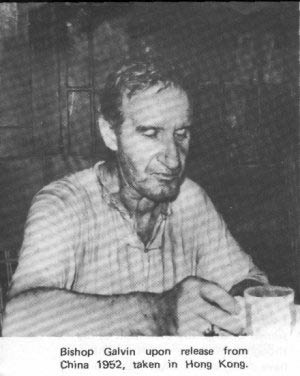 Outliving her husband by some years, she had good memories of married life, but her heart always cherished the memory of the Columban bishop in Hanyang and the priests and sisters that she had worked with in her days with the Handmaids of Our Lady.
Outliving her husband by some years, she had good memories of married life, but her heart always cherished the memory of the Columban bishop in Hanyang and the priests and sisters that she had worked with in her days with the Handmaids of Our Lady.
She could rattle off names, but only the Chinese ones by which the priests and sisters were known at the time, many of which have been lost in the dust of history.
Monica was a person full of love, humour and energy. She loved to entertain people in her simple Shanghai accommodation. She would fuss over them and chide them gently, saying, “When was the last time I saw you!”
Whether visitors were expected or not, there was always a meal, mostly prepared by a relative who lived in the same complex and looked after all her needs. A person endowed with the same love of visitors as herself.
She always had a gift for each visitor too—some coffee or a biscuit, even a piece of warm clothing if it was cold, all of which was pulled out of a cupboard in which she rummaged when someone dropped by unexpectedly.
“Monica was a glimpse into the past of a China I never experienced and will never know,” a much younger friend of hers reflected.
She was full of humour and her sympathy was staunchly with the unofficial Church community.
“There will never be another Chinese Monica. We live in that river of time. Only eternity will reunite us to those moments we fleetingly cherish on this ever so fast journey of life towards our future with God—and hopefully, Monica,” the friend concluded.
A Visitor from China
You have just visited Bishop Galvin’s grave in Dalgan? Yes this was a special moment for me, but also I felt so sad. It is clear that China was at the centre of the Bishop’s life, and that he and so many other Columbans gave their entire lives to that mission. Even today the Columbans continue the Bishop’s work. At the graveside I knelt and bowed three times to his grave. This is a Chinese custom of respect for the dead, one that I have done at funerals of members of my own family. I represented all the Sisters who never got the opportunity to pay their respects to the Bishop. He died in 1956, and, as all Columbans had been expelled since 1953, we were not even aware of his death until years later. I also visited the grave of Fr John Blowick, the co-founder of the Society. When you speak of Bishop Galvin you smile and look happy? I never knew the Bishop, but there is a picture of him on our convent wall. Our older Sisters tell stories of him: how he protected them at the time of the Japanese invasion; how he would share whatever he had with them; how he cared for them when they were sick, and made sure they had enough food. He supported their education and told them, "You are the hope of the Chinese women". We are so proud of him, the father who took care of us. Yes, the older Sisters always told us how much he loved us. They believe that from heaven he still looks
after us. So I prayed for the coming Chapter; for an increase in vocations to the congregation; for the sick; and for the grace to grow in holiness and to be guided in our choice of ministries. You also visited Newcestown, Co. Cork, the Bishop’s birthplace? Yes, the people were so welcoming, they seemed happy to greet somebody from China with close links to the Bishop. The people remembered the Bishop and various Columbans from the area who had worked in China. They were so hospitable, they have such a strong faith, and seemed so happy and hopeful. Clearly the Bishop’s memory is cherished, and the Parish Priest said he would like to maintain contact between his parish and our diocese. I asked the several prayer groups to remember our small convent in their prayers and gave them pictures of Our Lady of China. What of the Sisters’ apostolate today? Once we were revived, in the beginning we did not know what we should do. When I entered, four days later, one of our oldest Sisters asked two of us postulants to take a flask of water and some towels. We went to visit an elderly blind woman who lived all her life in one room. We helped her to wash and then prepared some hot food. She was so happy. Our job is really to help in the parish. We help with the preparation and administration of the sacraments; we go to the rural areas and stay for a week with the people, teaching them to pray and to sing. We also visit people with disabilities, those in hospital, the elderly. We are still learning skills to organise lay people to work together for sustainable pastoral work. Are you hopeful for the future of the Church in your area? Yes, I never doubt it but I come from a rare Catholic background. I experienced a personal conversion when I decided to become a Sister, because I allowed the Gospel, Jesus’s word, to change my life. Even though the economy in China gets better and better, I think there are people like me who need the Gospel. So, I think we will continue to find ways to bring faith to the people. As long as we need faith, we will have hope. What of your visit to Ireland? In the past I’d heard stories of Ireland. Now I saw the real people, the real Columbans and also their graveyard. I talked to many Columbans who spent their lives on mission and often I felt moved by their vibrant faith. I was delighted to visit Mayo to meet Fr John Blowick’s sister-in-law, Mrs Theresa Blowick. Her kindness and the stories she told about Fr John allow me to understand in a clearer way the deep faith of one who gave so much during the early years of the Columbans. In China we continue to benefit from that deep faith. It gives me great encouragement that you continue to live out your founders’ charism. You are studying now in the US? I study both social work and pastoral ministry. I study how to relate this work to China, how to combine both faith and service. I know I am very privileged. I have a special responsibility to continue the Bishop’s work, though today conditions are quite different. We still practice his ideals, his care for people, his zeal to spread the faith. We are grateful for the support of the Columban Fathers, but we need the help of your constant prayers and also those of your readers. Fr Dan Troy has worked in China over the past fifteen years. |
The unfinished story of a valiant woman
By Fr Joseph Broderick
The author is a Columban priest from Ireland. He was ordained in 1969. He went to Japan in 1970 and, apart from six years working in Britain, 1994 to 2000, has beenthere ever since.
 When we think of the missionary work of the Columbans in Japan we must not forget the Trojan work done by Japanese catechists. Very often they were the right-hand ‘Samurai’ of trailblazing Columban missionaries. One such catechist is Miss Tsuneko Hinata.
When we think of the missionary work of the Columbans in Japan we must not forget the Trojan work done by Japanese catechists. Very often they were the right-hand ‘Samurai’ of trailblazing Columban missionaries. One such catechist is Miss Tsuneko Hinata.
She was born into a traditional Buddhist family, grew up in the Buddhist tradition and after high school became a professional working woman in a company, but never married. At the age of 40, she ran into crisis time: ‘What is life all about? What am I working like a slave for? What happens to me after death?’
She went searching for answers in the Catholic Church. There she found Christ and her answers, and then went on to receive baptism. She was filled with joy and a new conviction.
But another crisis arose: ‘What do I do with this new joy and conviction? I have to share it with others. How can I do that?’
She decided to quit her professional career in the company and enter the Japanese Catechist School. As a newly graduated catechist she was first employed by the late New Zealand, Columban Fr James Norris and thus began her long journey working full-time for the church, with the Columbans, for meager wages and within even more ‘meager’ living quarters. She became the mouthpiece of the language-struggling Columbans, taught daily the doctrine to truth-seeking searchers, visited the sick at home and in hospital, walked with the newly baptized on their journey of faith in a non-faith environment, and became a spiritual mother to all her spiritual children. She took no credit for her work. It was her way of living out the Gospel.
In Tsuneko's life, she jumped from being a professional worker into the waters of baptism; jumped from the waters of baptism into the catechetical profession and from there she landed in the Columban world.

The Prophetess Anna (known as ‘Rembrandt’s Mother), Rembrandt, 1631
Riksmuseum, Amsterdam [Web
Gallery of Art]
She retired legally at the age of 65 but like St Anna in St Luke's Gospel, she was daily in the Church praising and glorifying God, teaching, visiting the sick, welcoming the stranger, guiding those searching for the truth and consoling the troubled. She never really retired. She is small in stature but big in heart; she is bent with age but straight in dedication and loyalty.
She has worked with many Columbans and Japanese priests, who change every few years but she stays on forever. She has witnessed the liturgical eccentricities of many Columbans but no matter who they were or what fancy ideas they brought with them, she took everything in her stride and smiled knowing that the next man would come with other ‘more wonderful’ ideas and plans.
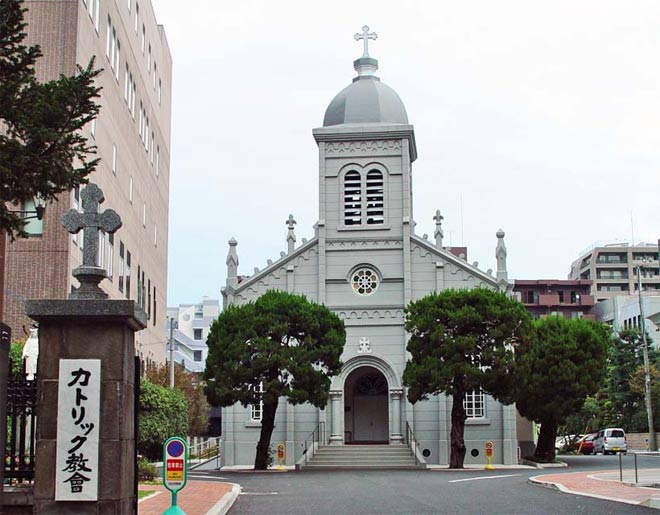
Our Lady of Japan Parish Church, Tetori, Fukuoka City [Daughters of St Paul]
Tsuneko is still at that original parish church of Tetori in Kumamoto City, Japan. Now at 94 years of age, she has suffered no deterioration of the memory or mind or love for Jesus Christ. No one thought that such a frail and lean-looking lady would last for so long without losing her zeal and zest. She knows she is outside the tombstone of life but she is already rejoicing in the new life ahead of her in God's Kingdom.
Kyrie (Lord, have mercy), Gloria (Glory to God in the highest) and Sanctus(Holy, Holy, Holy, Holy Lord) sung in Japanese
Music composed by Sakuro Takada
+++
A Samurai Saint who died in Manila?
In his article on 94-year-old catechist Miss Tsuneko Hinata Fr Broderick refers to her and other Japanese catechists as ‘the right-hand “Samurai” of trailblazing Columban missionaries’. The Samurai were the military nobility of Japan until relatively recent times. But there is one member of the Samurai. Takayam Ukon was a member of the Samurai who refused to give up his Catholic faith druing a time of persecution. With around 300 Japanese Catholics he sailed from Nagasaki on 8 November 1614 and died in Manila on 5 February 1615, 40 days after his arrival there. |
Peace by Peace

How does the practice and struggle of love keep transforming us? Jean Vanier, 2015 Templeton Prize Laureate.
The full version of Jean Vanier speaking on the Big Questions is here.
People with intellectual disabilities are not able to assume important roles of power and of efficacy. They are essentially people of the heart. When they meet others they do not have a hidden agenda for power or for success. Their cry, their fundamental cry, is for a relationship, a meeting heart to heart. It is this meeting that awakens them, opens them up to life, and calls them forth to love in great simplicity, freedom and openness. When those ingrained in a culture of winning and of individual success really meet them, and enter into friendship with them, something amazing and wonderful happens. They too are opened up to love and even to God. They are changed at a very deep level. They are transformed and become more fundamentally human. Jean Vanier, in accepting the 2015 Templeton Prize 11 March.

Lala feeding Jordan, Punla, L’Arche Community, Cainta, Rizal, Philippines
Give everyone what you owe him: If you owe taxes, pay taxes; if revenue, then revenue; if respect, then respect; if honor, then honor. Let no debt remain outstanding, except the continuing debt to love one another, for he who loves his fellowman has fulfilled the law. The commandments, "Do not commit adultery," "Do not murder," "Do not steal," "Do not covet," and whatever other commandment there may be, are summed up in this one rule: "Love your neighbor as yourself." Love does no harm to its neighbor. Therefore love is the fulfillment of the law.
-Roman 13:-10

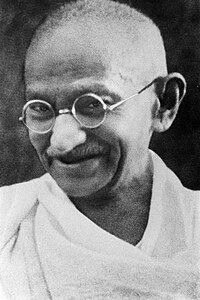 The weak can never forgive. Forgiveness is the attribute of the strong.
The weak can never forgive. Forgiveness is the attribute of the strong.
- Mahatma Gandhi

 “Humanity should question itself, once more, about the absurd and always unfair phenomenon of war, on whose stage of death and pain only remains standing the negotiating table that could and should have prevented it.”
“Humanity should question itself, once more, about the absurd and always unfair phenomenon of war, on whose stage of death and pain only remains standing the negotiating table that could and should have prevented it.”
-Pope John Paul II

“If you want happiness for an hour — take a nap.’
If you want happiness for a day — go fishing.
If you want happiness for a year — inherit a fortune.
If you want happiness for a lifetime — help someone else.”
-Chinese Proverb


Paul the Apostle, Rembrandt, c. 1657 [Wikipedia]
Pay to all what is due them—taxes to whom taxes are due, revenue to whom revenue is due, respect to whom respect is due, honor to whom honor is due. Owe no one anything, except to love one another; for the one who loves another has fulfilled the law. The commandments, “You shall not commit adultery; You shall not murder; You shall not steal; You shall not covet”; and any other commandment, are summed up in this word, “Love your neighbor as yourself.” Love does no wrong to a neighbor; therefore, love is the fulfilling of the law. [NRSVCE]


